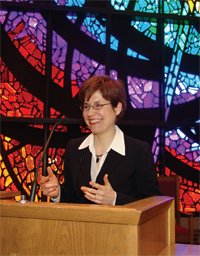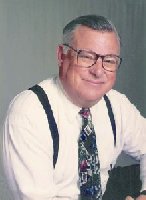WASHINGTON (ABP) — Early on in his House tenure, someone lit a religious-liberty fire under Rep. Chet Edwards — and, despite Edwards’ position in the most Republican House district in the country to be represented by a Democrat, that fire never burned him.
Although the self-described “husband of a Baptist preacher’s daughter” has represented a very conservative and rural part of Central Texas for nearly 20 years while simultaneously and outspokenly advocating for strict church-state separation in Congress, he never suffered any significant political damage from his stances on religion. What finally did the 59-year-old in last month is the same anti-incumbent, anti-government wave that upended virtually all moderate and conservative Democrats representing “red” districts this year.

Outoing Rep. Chet Edwards (D-Texas) has earned a reputation as a staunch, if unlikely, defender of church-state separation in Congress. (Photo courtesy Edwards\' office)
|
“I never lost an election over this issue,” Edwards said in a Dec. 2 interview from his House Appropriations subcommittee office. “My defeat in 2010 was more about national politics and the nation’s unemployment rate than it was about church-state.”
But even if he had finally lost his seat (which he held onto even after Lone Star State Republicans re-drew district lines in 2005 specifically to oust him) over his defense of church-state separation, Edwards said, it would have been worth it.
“If you’re not willing to lose an election over important principles, then you don’t deserve to ever win an election,” he said. “And church-state separation has always been an issue that I was more than willing to lose over, because I know there are a lot of people throughout the world who have sacrificed more than elections in their defense of religious freedom.”
Inspired by Reynolds and Truett
Although Edwards still officially lists himself as a Methodist in congressional biographies, he has long attended Baptist churches — Calvary Baptist Church when he is at home in Waco, Texas; and McLean Baptist Church in Washington’s Northern Virginia suburbs. He credits a Baptist university president and a famous Baptist preacher’s sermon with inspiring in him a deep passion for religious liberty and church-state separation.
“About 15 years ago, Herb Reynolds and I were having lunch together … and we started talking about church-state issues and he sent me a copy of George Truett’s speech on the steps of the Capitol in 1920 on religious liberty,” he said. “And after I read that speech, I was hooked.”
At the time Reynolds, who died in 2007, was president of Baylor University. Truett, legendary pastor of the First Baptist Church in Dallas from 1897 to 1944, delivered his famous Capitol-steps speech to Southern Baptist Convention messengers, meeting in Washington in 1920, extolling religious liberty.
“That utterance of Jesus, ‘Render therefore unto Caesar the things which are Caesar's, and unto God the things that are God's,’ is one of the most revolutionary and history-making utterances that ever fell from those lips divine,” Truett said in one of the most-quoted portions of his speech. “That utterance, once for all, marked the divorcement of church and state. It marked a new era for the creeds and deeds of men. It was the sunrise gun of a new day, the echoes of which are to go on and on and on until in every land, whether great or small, the doctrine shall have absolute supremacy everywhere of a free church in a free state.”
Reynolds’ advice and Truett’s words helped convince Edwards of church-state separation’s paramount importance in safeguarding religious freedom.
“What was so clear to me in Truett’s speech was the idea that religious freedom was a divine gift, and it is sacrilegious to infringe … on that freedom,” he said.
But Edwards didn’t see many of his fellow moderate-to-conservative Democrats in Congress talking much about church-state issues.
“I started asking around in the House and found very few members who had focused on this issue. And I decided somebody has to speak up — and that we need voices that come not just from the ACLU and other liberal organizations,” he said. “We need moderate and conservative voices speaking out in defense of church-state separation — because, after all, it is a very conservative principle, the idea that religion should be put on a pedestal high enough to be beyond the reach of politicians or politics.”
Fight over school prayer
His first chance came quickly. In mid-1995, a House committee began having hearings on a proposed constitutional amendment, championed by then-Rep. Ernest Istook (R-Okla.), to make room for “student-sponsored” prayer in public schools as well as “acknowledgements of the of the religious heritage, belief or traditions of the people.” Edwards became one of its most outspoken opponents, and it eventually the amendment was derailed.
For his role in stopping Istook's efforts, Edwards earned the scorn of the Christian Coalition. They distributed a brochure to voters in his district accusing the young congressman of being un-American — and, even worse, un-Texan — for his opposition to the amendment.
“And I thought how odd it is that I can be accused of being un-American because I was defending the Bill of Rights,” he said.
Edwards went on to weigh in repeatedly in favor of strict church-state separation in fights over things like public display of the Ten Commandments and government funding for religious charities.
He’s been given religious-liberty awards by several Baptist organizations, including the board of directors of Associated Baptist Press.
On social issues other than religious liberty, though, Edwards has often been criticized from the left. Gay-rights groups give him poor marks while the National Rifle Association rates him highly. He opposed the health-care-reform bill that President Obama signed earlier this year.
Islam and the future
In September, Edwards took some hits from friends in the religious-liberty community for issuing a statement opposing a controversial Islamic community center planned for a site a few blocks away from the former World Trade Center location in Lower Manhattan.
But Edwards said his opposition was a matter of prudence rather than the law.
“I tried to be very clear in my statement that I believe that Muslims have the right to build mosques or community centers where any other faith has the right to build such a house of worship or center,” he said. "I felt that, given some of the far-right talk-show discussions and the environment in the country, that this would actually push us backwards in terms of rights for Muslims,” he said.
Edwards believes the ongoing controversy over the site has proven his fears right. “That whole debate created a backlash against Muslims in this country and we need less of that, not more of that,” he said.
The rights of Muslims may be the next big test of religious liberty in the United States, he contended — and that fits in with a pattern in American history of threatening the rights of unpopular religious minorities.
“The pathway to losing religious liberty begins not by inhibiting the rights of the majority but the rights of the minority,” he said. “Once that foundation — that foundation of religious liberty for every citizen — is undermined, then the foundation upon which we all stand is put at risk.”
While polls show that fiscal rather than social issues were important to the voters who put Republicans in charge of the House this time around, Edwards believes the culture wars will inevitably return to the fore in the 112th Congress.
“My guess would be that, if not in 2011, in the 2012 election year there will be a rash of bills introduced to not just chip away but tear down the wall of separation between church and state,” he warned.
Baptist advocates for church-state separation who have worked with Edwards over the years are lamenting his impending departure from Congress.
“Chet has been a dedicated public servant and a great friend of religious liberty,” said Brent Walker, executive director of the Baptist Joint Committee for Religious Liberty. “His long-standing commitment to the principle of religious liberty and willingness to speak out on its behalf served as a witness to other members of Congress, who counted on his voice on the issue.”
Related ABP stories:
Hundreds gather in Waco to honor late Baylor president Reynolds (5/31/2007)
In reauthorizing Head Start, House rejects religious discrimination (5/4/2007)



